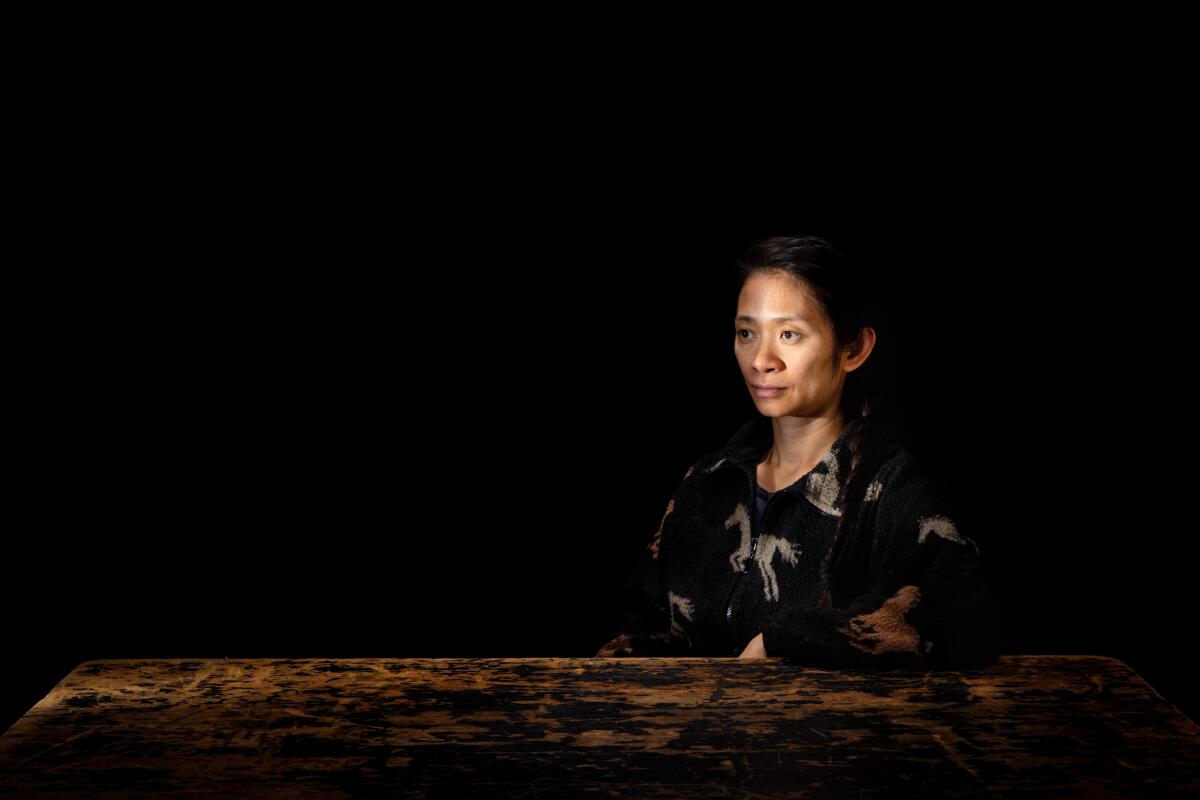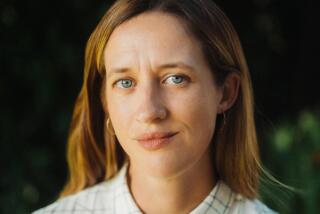‘Nomadland’s’ Chloé Zhao embraces community at every turn

- Share via
Chloé Zhao has been holed up at a Burbank Airbnb guesthouse for more than a month now, working seven days a week on “Eternals,” the upcoming cosmic gods Marvel movie she directed and cowrote. The cottage is a five-minute drive from Walt Disney Studios. She probably could have stayed in a bigger place or a four-star hotel, but Zhao likes the coziness. She also appreciates the way its modesty contrasts with the work she’s doing — and relishing.
“When you’re making a film and everything feels so big and expensive, it’s really nice to come home to a cave at night,” Zhao says. We’re talking via Zoom early on a recent Saturday morning, sipping coffee, shaking off the sleep. She’s telling me about the few personal touches she brought from her Ojai home: the warm, wool blanket she purchased in England while shooting “Eternals,” the rice cooker and the kitchen utensils needed to fully employ and enjoy that beloved steaming appliance.
For the record:
3:09 p.m. April 13, 2021This article gives the title of Zhao’s 2015 debut feature as “Songs My Father Taught Me.” It is “Songs My Brothers Taught Me.”
“Dairy products do not agree with her digestive tract,” Frances McDormand tells me when asked what I should know about Zhao. It’s the most McDormand answer I can possibly hope for, the plainspoken star of Zhao’s Oscar-nominated film “Nomadland” dishing on her director, remembering the first time they met after a screening of Zhao’s acclaimed western “The Rider” at the 2017 Toronto International Film Festival.
“Fun, eclectic, casual and professional, typical of the rest of how we proceeded,” McDormand notes. “She sat on the floor; we both kicked off our shoes. We recognized each other pretty fast. We have a lot in common: We set our professional bar very high, and the one that suffers first for not reaching that bar is usually ourselves.”
Eight months ago, Zhao and McDormand were about 10 miles east of Burbank at the Rose Bowl for a pop-up drive-in screening of “Nomadland,” the best picture contender that earned six Oscar nominations, one for McDormand’s lead turn, four for Zhao (as a producer, director, writer and editor — the first woman to do so), as well as a nod for cinematographer Joshua James Richards, Zhao’s longtime collaborator and partner.
It’s the only movie Zhao has seen outside her living room this season and marked the first time she’s ever been to a drive-in. The evening was memorable for a hundred other reasons, one notable example being that ash was falling from an evening sky that had turned orange because of the nearby Bobcat Fire in the San Gabriel Mountains. Driving down from Ojai, Zhao felt a little depressed and, looking around after she arrived, she even wondered if people would be able to see the screen through the smoke.
Then, as the movie was about to start, she had a moment of unexpected catharsis. One of her all-time favorite films, “The Empire Strikes Back,” began showing at a regular drive-in next door. Zhao could see the lightsabers reflecting on the screen playing “Nomadland.” Midway through the movie, she walked to the bathroom at the Rose Bowl and on the way back took a peek, “probably longer than I should,” at “Empire” across the way.
“You didn’t see the lightsaber reflecting on our screen?” Zhao asks me. Nope. “You must be very focused. I appreciate that. If you moved your rearview mirror, you could have watched ‘Empire Strikes Back’ in your car with the sound of ‘Nomadland.’”
That would have made for a different evening. “Nomadland” is a movie about Fern, a widow (McDormand) taking to the road, wandering through western America, discovering a subculture of fellow travelers who live out of RVs, campers and cars and, in turn, finding herself. Watching that story at that particular moment and in that particular setting, with the nomads depicted in the movie among the audience at the Rose Bowl parking lot, resonated deeply. It was perfect.
“I wouldn’t ask for it any other way, which goes with a philosophy I have a lot of faith in: Everything happens for a reason,” Zhao says. “It brought people closer together.”
With the surge of anti-Asian racism and violence, the Beijing-born Zhao has been thinking of community lately, phoning friends to check in and offer encouragement. “Even just a stranger walking down the street, you smile and you wave and you might make their day,” Zhao says. “To be vulnerable and put yourself out there ... you might not say the perfect thing, but the act of doing it, I promise it means something.”
Zhao’s three movies — her 2015 debut “Songs My Father Taught Me,” “The Rider” and “Nomadland” — have been centered on communities, filled with nonprofessional actors playing fictionalized versions of themselves. In “Nomadland,” she placed McDormand and actor David Strathairn, whom McDormand recommended (“we are ‘seasoned individuals’ and therefore have a lot of stories to tell,” she says), among a group of older nomads who migrate between seasonal jobs in their “retirement.”
It’s a transient lifestyle that should be a choice, but, instead, for many, it’s a necessity because of America’s eroding safety nets. The film shows Fern working a variety of jobs — packing boxes at an Amazon warehouse, cleaning toilets as a camp host in Badlands National Park, shoveling sugar beets at a Nebraska processing plant. Zhao passes no judgment on the labor. The issue for her is the system that ignores eldercare.
“I’m trying to think of my grandmother working like that,” Zhao says. “Societies would benefit so much by putting more importance on our elders.”
Zhao has done a fair amount of car camping herself, spending weeks sleeping in her Subaru. After she agreed to make the movie with McDormand, she bought a camper van, named it Akira and began personalizing it, as nomads do. For Zhao, this meant turning it into the “most powerful solar [vehicle] you can imagine,” enabling her to power anything she wants — the camera used for “Nomadland,” props, her laptop and, yes, her rice cooker. A staple of the shoot: gluten-free porridge, though she did indulge in the doughnuts at Wall Drug, the massive roadside tourist stop in South Dakota seen in the film.
“I have spent so much time in rural South Dakota in that building,” Zhao says of the attraction in the state where she shot her first two films and lived for stretches after graduating NYU’s film school.
Zhao began building Akira about a year before shooting “Nomadland.” In six months, the camper van was finished, with that “ridiculous,” huge rooftop solar panel installed, and she began driving through the West, scouting locations, meeting nomads and listening to their stories. “She leads you to a place of trust,” McDormand says, “and is truly fascinated by people and their stories, which compels one to keep sharing.”
“She’s an inquisitive person about the world and about movies, and that’s why her movies work,” adds Marvel exec Nate Moore. “She’s not coming with a set of assumptions about nomads or cowboys or Native Americans. She’s trying to investigate it. It’s weird to say she wanted to investigate these cosmic gods who came to Earth in the ‘Eternals,’ but she did. What would that be like? She’s curious. And she questions everything.”
Zhao even questioned the one thing she thought she knew for certain: that the movie would end [and, if you haven’t seen “Nomadland,” you should stop reading here] with a shot of McDormand’s widow returning to Empire, Nev., the deserted mining town where she and her husband once lived, walk through her old house and, evoking the final moments of John Ford’s classic western, “The Searchers,” exit through a door, striding into the open landscape of the horizon.
Zhao had that image before she began writing the script. When she and Richards found the house on a location hunt, Richards took a photo of Zhao walking through the back door. Zhao loved the idea of seeing McDormand flip the gender script of traditional westerns where the man is the one walking away into the wilderness, leaving the women behind to tend the homestead. “It’s an hommage to ‘The Searchers,’ but it gives a 2020 flavor to it,” Zhao says.
But when she began editing “Nomadland” and holding virtual test screenings (“I love to get audience feedback”), Zhao felt the movie needed to end on a more optimistic note and added a shot of McDormand hitting the road, continuing her journey.
“I started editing at the beginning of the lockdown and finished around May, and I felt we needed to be a bit more hopeful, to say, ‘We can keep moving, we can keep going,’” Zhao says. “I ask myself if I had edited this film not during a pandemic, would I have been, like, ‘Nah. It ends at the door.’” She laughs. She knows that everything happens for a reason.
A lifeline for the mobile community
Bob Wells, who stars with Frances McDormand in “Nomadland,” is a co-founder of Homes on Wheels Alliance, an organization in support of the mobile community and nomads in need. One HOWA program provides emergency funds for nomads who have exhausted their savings. Another effort outfits minivans as compact, safe and secure homes on wheels for those on the edge of homelessness. As in the film, HOWA events bring nomads together for classes and community — around a campfire, at shared meals and even on Zoom. To learn more about HOWA, go to HomesOnWheelsAlliance.org.
More to Read
From the Oscars to the Emmys.
Get the Envelope newsletter for exclusive awards season coverage, behind-the-scenes stories from the Envelope podcast and columnist Glenn Whipp’s must-read analysis.
You may occasionally receive promotional content from the Los Angeles Times.











